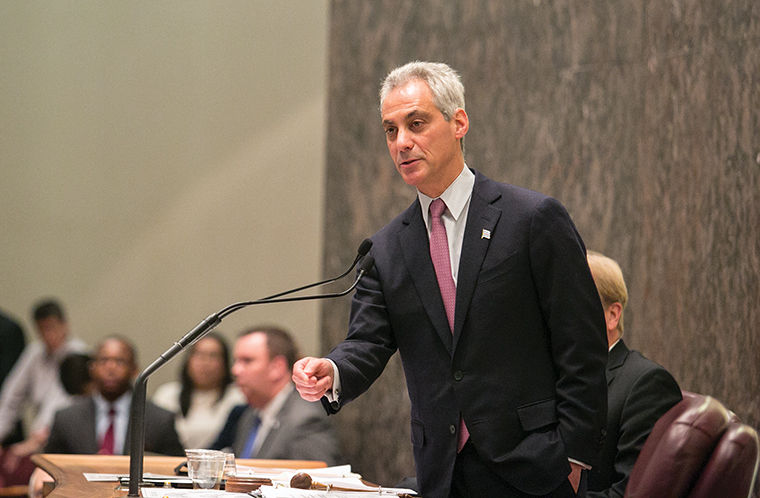IlliniCare Health establishes center in North Lawndale
IlliniCare Health establishes center in North Lawndale
December 8, 2014
Mayor Rahm Emanuel and Jeff Joy, CEO of IlliniCare Health, announced in a Nov. 21 press release that the company will provide 300 additional jobs in Chicago.
As a result of the Affordable Care Act and Medicaid expansion, IliniCare will have created approximately 500 jobs in Chicago, including positions for social workers, nurses and entry-level positions, according to the press release.
IlliniCare has created a pilot neighborhood community hub facility, located at 3954 W. Cermak Road in North Lawndale. The purpose of the program is to create a greater presence in the communities they serve in Chicago.
“IlliniCare’s decision to grow in Chicago is a reflection of what is happening in Chicago’s overall healthcare economy,” Emanuel said in the press release. “With new innovations in technology, the expansion of affordable care and increased funding coming into the city, more companies are looking to Chicago to hire from a diverse and deep pool of talent available here.”
Loren Buford, grew up on the West Side and said she thinks it is great that IlliniCare Health is establishing a hub in Lawndale. She said there is a lack of jobs in that community, and the hub will provide much-needed employment.
“I like the fact that [it offers] entry-level all the way through professional health care level [jobs],” Buford said. “There are a lot of our doctors, nurses and social workers that are looking for jobs everyday and to be able to find them within their own community and the areas that serve poor people, I think that’s wonderful, especially if we can provide quality care in those neighborhoods to the people that need it most.”
Marcus Spencer, a project lead for the Chicago Urban League, a nonprofit organization that helps people find jobs, housing and education in communities around the city, said he is happy that IlliniCare Health is creating jobs. However, he said he is concerned that the jobs may not be given to people who live in those communities because the jobs that will be created require certain qualifications that many in those communities do not have.
“It’s great that they’re creating jobs, but who are they creating jobs for?” Spencer said. “Are low-income people qualified for these jobs? Probably not if they don’t have the education. If people that live in Naperville, Orland Park or Lincoln Park are taking advantage of these jobs, it’s really not doing a service to the people it’s really meant to help.”
Jasmine Williams, a Chatham resident, said if businesses and IlliniCare Health is intentional about the way they set up programs, they can counter the backlash that may happen. She said the city should want residents to have jobs that benefit those people who are in the community but make sure those people are qualified for those jobs.
“Chicago as a whole can benefit from it,” Williams said. “If you put things in place like partnerships with community organizations, you can earmark a certain amount of those jobs to be for people who have a Lawndale district address. There are ways you can put things in place so [that] it is not so big that the people who live down the street from it can’t come there and get a job.”
IlliniCare Health projects that its staff in Chicago will grow from 150 employees to more than 500 by 2015, according to the press release.
“We are excited to be setting down roots in Chicago,” Joy said in the press release. “The city presents fantastic opportunities to pursue our mission—transforming the health of the community one person at a time. With a diverse workforce base and such great neighborhoods and community partners, Chicago offers us an unprecedented opportunity to succeed.”
Spencer said adding jobs in North Lawndale is pivotal for black people. He said he thinks unemployment in black communities is a direct link to the crime plaguing black communities, and providing more jobs will allow more people to access health care.
“The reality is that there are a lot of working poor people,” Spencer said. “When you’re the working poor, you really can’t afford health care. If you work a minimum wage job or a job that you can barely provide for your family, do you take health care and live in poverty or do you not have health care? It eliminates those painful decisions that you have to make.”
Williams said the pilot neighborhood hub in North Lawndale would benefit those who need jobs because they can work in their own neighborhoods opposed to traveling to the suburbs.
“It’s helpful to have jobs that are accessible to people,” Williams said. “A lot of times transportation is a barrier, so I think that it will be good for the community.”
Spencer said it is important to remember that these businesses are taking full advantage of the U.S. by getting tax breaks while the middle class is struggling. He also said most businesses do not want socialized health care because they would be required to pay for health insurance for their employees.
“If they paid more of a percentage of their taxes, then we will be able to have programs like the Affordable Care Act,” Spencer said. “Not only that, but grants for colleges. They’re not giving out financial aid like they used to, so is college for the rich now? A lot of college students are struggling just paying their student loans because they’re getting these jobs they can’t sustain and now they’re asking them to pay it back.”
Spencer said people in areas like Lawndale are tired of not having jobs and resources in their neighborhoods and not having affordable health care.
“People are losing hope when they work 40 hours a week and they can barely survive,” Spencer said.








